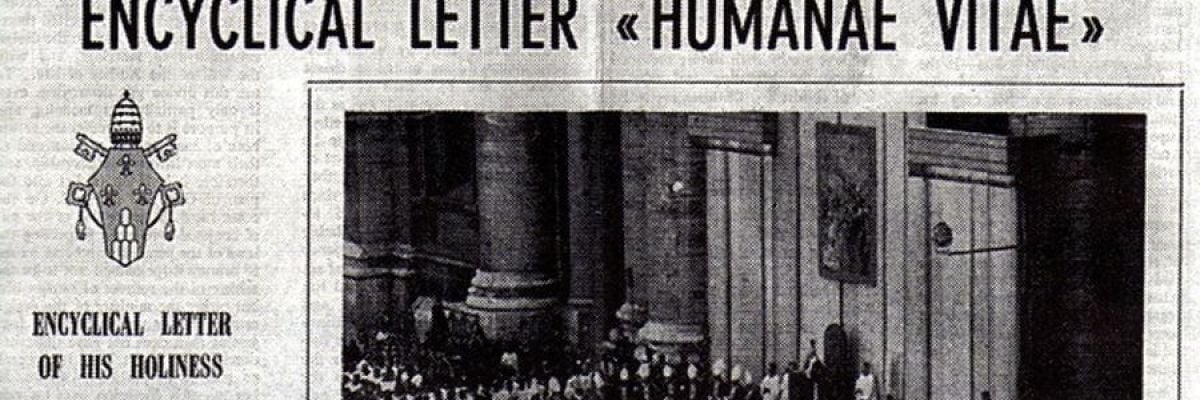
This week we commemorate the fiftieth anniversary of the promulgation of Humanae Vitae, the encyclical that confirmed longstanding Catholic teaching on birth control and warned prophetically of the social evils of a contraceptive culture.
In issuing Humanae Vitae fifty years ago this week, Bl. Pope Paul VI affirmed anew the Church’s longstanding and definitive teaching on contraception. But the encyclical’s opponents resisted, claiming that the doctrine had, somehow, become non-infallible and thus morally optional for Catholic families to embrace.
From time immemorial, the “uninterrupted Christian tradition” regarding contraception was never in doubt, as Pope Pius XI reaffirmed in 1930. It wasn’t an issue during the Protestant Reformation, and for centuries thereafter Protestants were undivided in their assent that contraception constituted a moral evil that was harmful to marriage and family life.
But the twentieth century’s eroding sexual mores, to which the Church of England was the first to capitulate when it sanctioned contraception at its 1930 Lambeth Conference, led to a hostile reception, even among many Catholics, when Humanae Vitae appeared in 1968. This opposition has since endured both inside and outside the Church, despite the ensuing decades of social fallout that Paul VI predicted would occur if his prophetic warnings were not heeded. To this day, Catholic dissenters busy themselves denying that the encyclical contains binding, infallible teaching.
Yet it is the dissenters’ own fallibility that is revealed through the manifest deficiency of their arguments and supporting doctrinal evidence. A representative example is the work of Francis Sullivan, S.J., now ninety-six and one of our era’s most influential theologians regarding the Magisterium (though, regrettably, not one of the most reliable).
Although Fr. Charles Curran may be better known for leading the initial opposition to Humanae Vitae—only days after its promulgation—Fr. Sullivan neatly distills the basic arguments that Curran and others have used to oppose the Church’s teaching. His book Creative Fidelity doesn’t focus on Humanae Vitae in particular or contraception in general, but it provides insight to how theologians justify their dissent from definitive Church teachings.
One argument Fr. Sullivan and others use is that the Church has not issued a solemn definition regarding contraception, in contrast to how Pope Pius IX solemnly defined the dogma of the Immaculate Conception in 1854, or how the Council of Trent (1545 to 1563) solemnly defined the Church’s teaching on the Eucharist. These are exercises of the Extraordinary Magisterium, which would include solemn definitions from a pope or an ecumenical council. Such defined teachings are infallibly taught (CCC 891).
Such definitions, however, are typically issued on matters of faith, not morals. (For example, there has never been a solemn definition about the immorality of fornication.) Much of Church teaching, particularly regarding morals (including fornication), is definitively (and therefore infallibly) taught without a solemn definition. This takes place through the Ordinary and Universal (O&U) Magisterium, i.e., the pope and the bishops in union with him, whether gathered together at an ecumenical council or dispersed throughout the world (see CCC 889-91; Lumen Gentium 25). The infallibility of O&U magisterial teaching derives from its being rooted in the perennial and faithful presentation of the Church’s deposit of faith that the Church received from the apostles (Acts 2:42; CCC 84-90).
The pope is the one person without whom the Church’s Magisterium cannot be exercised. Consequently, when a pope reaffirms the Church’s “constant teaching,” as Paul VI did in issuing Humanae Vitae, the definitive character of such papal pronouncements is rooted in the constant tradition that comes to us from the apostles (CCC 75-79; see also 88, 2035-36).
Another argument that dissenters make against the infallibility of Humanae Vitae regards the lack of “consensus” about it. The very existence of widespread dissent, they suggest, contradicts infallibility.
In making this argument, Fr. Sullivan misrepresents an 1863 letter from Pope Pius IX to the archbishop of Munich, in which the pope says that a fruit—not a certification—of the O&U Magisterium’s infallible teaching is the “universal and constant consensus of Catholic theologians.” Fr. Sullivan misconstrues the pope’s statement as providing theologians a trump card against the Magisterium
[I]f it becomes evident that there is no longer a consensus on some point of doctrine about which, in former times, there was a consensus, it would seem necessary to conclude that this is not the kind of constant consensus that points to infallible teaching.
First, there’s the irony that Fr. Sullivan uses a non-definitive papal writing—a private letter to a bishop—to draw conclusions about what constitutes definitive Catholic teaching! Moreover, we must recognize that given the human character of its membership, the Church has always had and will always have dissenters in its midst. There is no teaching that will ever be safe from some naysayer spoiling the “consensus.” The idea that the Church’s saving teaching could be kept in a perpetual state of doubt—held hostage to the whims of theologians—is preposterous.
There are no such doctrinal disclaimers in the Church’s teaching on infallibility in Vatican I, which Pius IX oversaw several years after his letter to the archbishop of Munich. Nor are there any, unsurprisingly, in Vatican II, whose more expansive teaching on infallibility is nonetheless rooted in the prior council. In short, neither common sense nor conciliar teaching provides any support for Fr. Sullivan’s thesis about a “consensus of theologians.”
Fr. Sullivan and other dissenters further claim that even though a pope may pronounce that a teaching is infallibly taught by the O&U Magisterium, that pronouncement can be shown to be false if a constant consensus of Catholic bishops—or even that of the faithful—has not been maintained from generation to generation. This is indeed “creative fidelity”!
Here Fr. Sullivan and others like him are arrogating to themselves, as theologians, magisterial prerogatives that belong to the pope and the bishops in union with him. Yet this so-called sensus fidelium (sense of the faithful) argument is likewise preposterous. No group of the faithful in any age, nor indeed any group of bishops (including those who are in canonical union with the pope but who betray their sacred duties through dissent from Sacred Tradition) has veto power to counteract Catholic teaching. Indeed, as Vatican II teaches, the true sensus fidelium—the unanimity of the faithful in upholding a Church teaching—is a blessed fruit of the Church’s charism of infallibility, not a prerequisite for its actualization (Lumen Gentium 12).
Given Fr. Sullivan’s doctrinal requirement that future generations of bishops, theologians, and the general faithful are required to validate non-defined teachings as being infallibly taught, we are again faced with the problem: how could any present generation be certain that any doctrine has been infallibly taught without the issuance of a solemn definition? According to Fr. Sullivan’s principles, later generations could conceivably dissent and thus veto the previous generation’s seemingly “absolutely certain” judgment on a particular doctrine. Consequently, any non-solemnly-defined doctrine would be up for grabs until if and when the Church made a solemn definition on it.
No doubt previous centuries of popes and bishops would be flabbergasted by the theories that modern dissenters concoct to sidestep the teaching of Humanae Vitae. They knew that the Church provides no quasi-magisterial veto power to bishops, theologians or the faithful, either in one age or across generations. They knew that magisterial teaching can be infallible and binding without an extraordinary definition. And they knew that when a pope definitively reaffirms Sacred Tradition, as Paul VI did in Humanae Vitae, we can be sure we are in possession of divinely given truth that sets us free, now and forever (John 8:31-32).
For more on the many dimensions of wisdom found in Humanae Vitae, check out the new book Inseparable from Catholic Answers Press, available now at a special introductory price.



